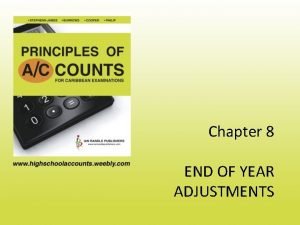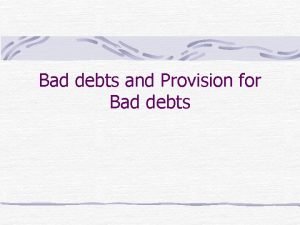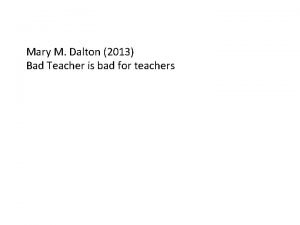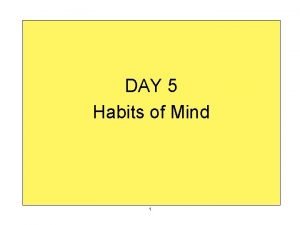TEACHER BAD HABITS TIPS Common bad habits I

TEACHER BAD HABITS

TIPS • Common bad habits I have come across • Knowing about these will help you to think about your own teaching habits.

WHEN CREATING LESSON PLANS

WHEN CREATING LESSONS PLANS • . . . don’t strongly link activities to lesson objectives. • Remember all parts of the lesson should be linked to your main lesson objective. A lesson plan is like a chain, if a link is weak or missing the whole chain falls apart. • . . . are Insensitive to students wants and needs Ex. Topics, activities etc. • Just because something is interesting to the teacher doesn’t mean the students will feel the same way. Remember that teaching is about the students. Listen to your students and work with them. Appealing to what they are interested in is a great way to keep students interested in – and actively participating in - your lesson.

TEACHER TALK

TEACHER TALK • . . . talk too much • Don’t be pressured into using English in the classroom to impress students, parents or anyone else. Be confident in using effective teacher talk in the classroom. Remember: less is more! • … use difficult or irrelevant vocabulary when teaching • The best judges of your teacher talk are your students! If they can’t understand you, you probably have to simplify your speech. Remember: the target level of your teacher talk is only slightly higher than your average student(s) (I+1 NOT I+10!). • Keep It Short and Simple!!

TEACHER TALK • . . . don’t demonstrate. • Show your students! Don’t just tell them. Whenever you are giving out a worksheet or explaining how to do an activity be sure to DEMO it first! Even better, demo it with your students! • . . . check if students understand by asking “Do you understand? Got it? Do you know what to do? ”. • These are ineffective ways to check is students have really understood. Students will either be too shy to admit that they don’t understand or they may think they understand but they have misunderstood! Check using CCQs and ICQs. • … try to memorize all of their teacher talk! • Memorizing all of the teacher talk in a lesson makes a teacher robotic. A teacher is more focused recalling all of the words they memorized than using effective teacher talk for students. Making a few notes is ok, but memorizing all of your teacher talk is NOT!

AT THE BEGINNING OF THE LESSON

AT THE BEGINNING OF THE LESSON • … start the class by asking irrelevant or unnecessary questions as a routine. • How’s the weather today? Did you have lunch? Questions like these have no natural purpose. A better question to ask at the beginning of class would be “What is the date today? ” in which students would be practicing authentic language ( months, ordinal numbers and days of the week. Even better would be to ask questions that would lead in to the topic of the day. • … start the lesson by having students chorally drilling lesson objectives. • This is unnecessary repetition of meta-language. It is better to simply explain to students what they will be learning “Today we are doing to learn about …” Better still is to provide students clues and then elicit from them what they will learn in the lesson. • . . . start the lesson by telling students how nervous they are. • Automatically students lose confidence in their teacher! You may feel nervous but don’t tell this to your students.

WHEN SETTING UP THE CLASS

WHEN SETTING UP THE CLASS • . . . use poor seating arrangement • The seating arrangement is extremely important in a language classroom. Don’t be afraid to change the seating arrangement to compliment your activities or objectives. • . . . create a very tense language learning environment. • A comfortable atmosphere will help facilitate the language learning process. Students’ own anxieties restrict them from using English. By reducing the tension of the class you will also reduce some of the students’ anxieties.

WHEN RUNNING ACTIVITIES

WHEN RUNNING ACTIVITIES • . . . emphasize the difficulties of learning English. • Stay positive and encourage your students constantly. This will build their confidence rather than shatter it! • . . . hand out materials before giving instructions. • As soon as you hand out materials a student’s first reaction is to look at the worksheet or start on the worksheet. In this case the teacher has to regain the attention of students to give the instructions. Give instructions and DEMO first! Hand out the materials when you want your students to start! • . . . ask “Are you having fun? Did you have fun? ”. • Teachers think that they are eliciting a positive response but in most cases they elicit a negative one. There is no need to ask this. Teachers know whether or not students have enjoyed something or not.

WHEN RUNNING ACTIVITIES • . . . are poor at time management and often cut or continue activities when they shouldn’t. • If an activity is going well keep it going! If an activity is not working well cut it and move on. • . . . stick too tightly to their lesson plan (not flexible). • Remember a lesson plan is a guide but not a law. Lesson plans are linear but teaching a class is not. Go with the flow of the class rather than following each step robotically. • . . . are scared of noise in their classroom. • Remember, this is language class and to improve this skill we have to practice it! Communication can sometimes be noisy and this is not a bad thing if it is controlled noise. It is much worse to have a completely silent language class where the teacher is the only one who is talking.

WHEN RUNNING ACTIVITIES • . . . don’t monitor. • While students are doing an activity do not just stand around. Move around, help students, error correct, participate. • . . . let strong students control the class. • Make sure all of your students are involved. Don’t focus all of your attention on the strong students. Ask weaker students to be your helper to DEMO things, pair weaker students with stronger students and teach the stronger student how to help you teach the weaker students. This principle (peer teaching) can take much of the workload off busy, overburdened teachers. Korean students usually help each other anyway, so take advantage of this and put your stronger students to work for you. • . . . ask for volunteers • Asking for volunteers creates problems. Either nobody volunteers, or the stronger students are the only ones who volunteer. Instead, just call on students to help you. “Can you help me? ”

VIEW OF LANGUAGE TEACHING

VIEW OF LANGUAGE TEACHING • . . . think language teaching is just like any other type of teaching. • Language teaching is very specialized. A language teacher’s classroom, methods and techniques may be different from others (ex. seating arrangement, level of noise, amount of activity, teacher’s role etc. ) , but that is ok! Remember, Language is a skill that needs to be practiced not a subject filled with content that needs to be memorized!


- Slides: 19





































